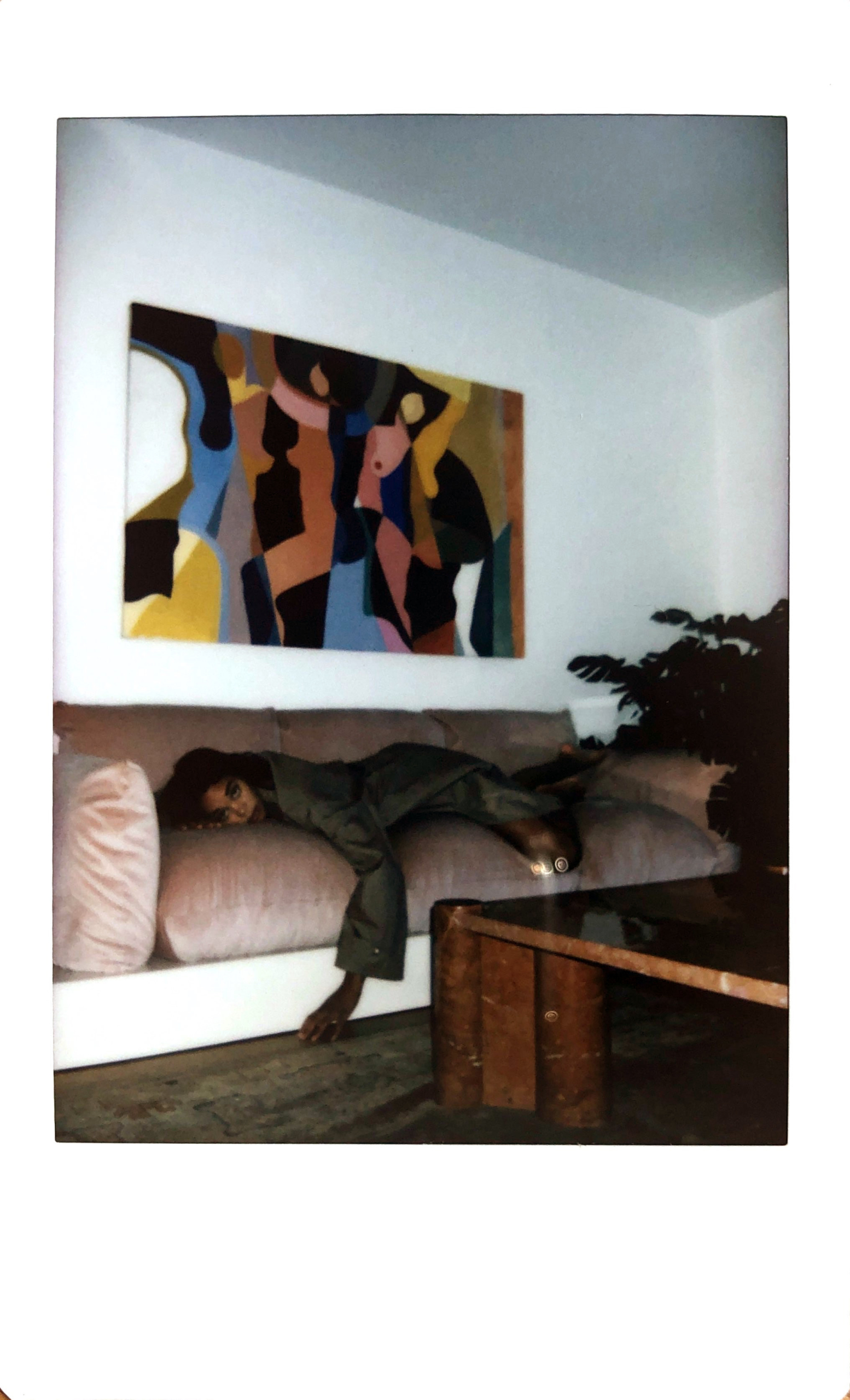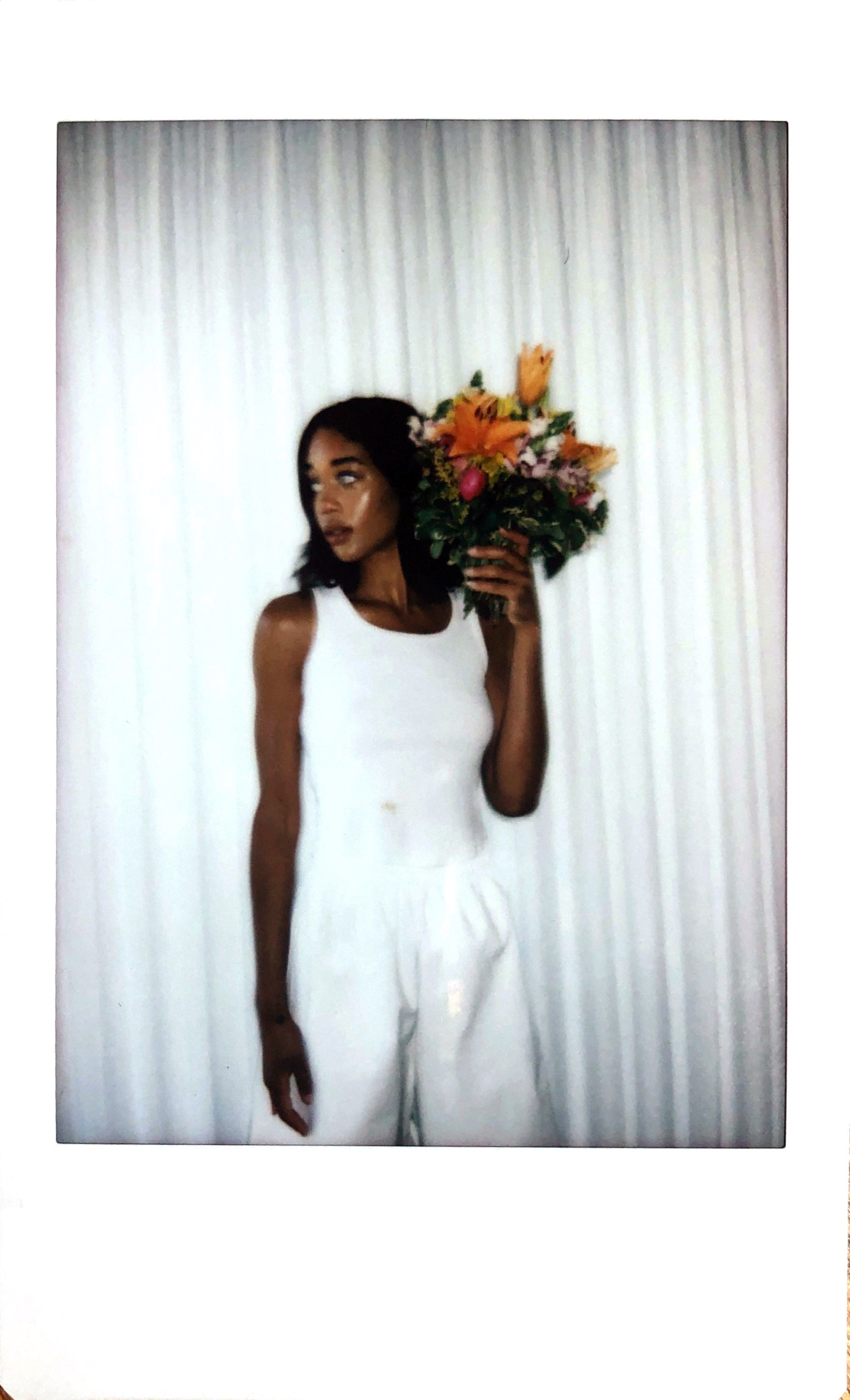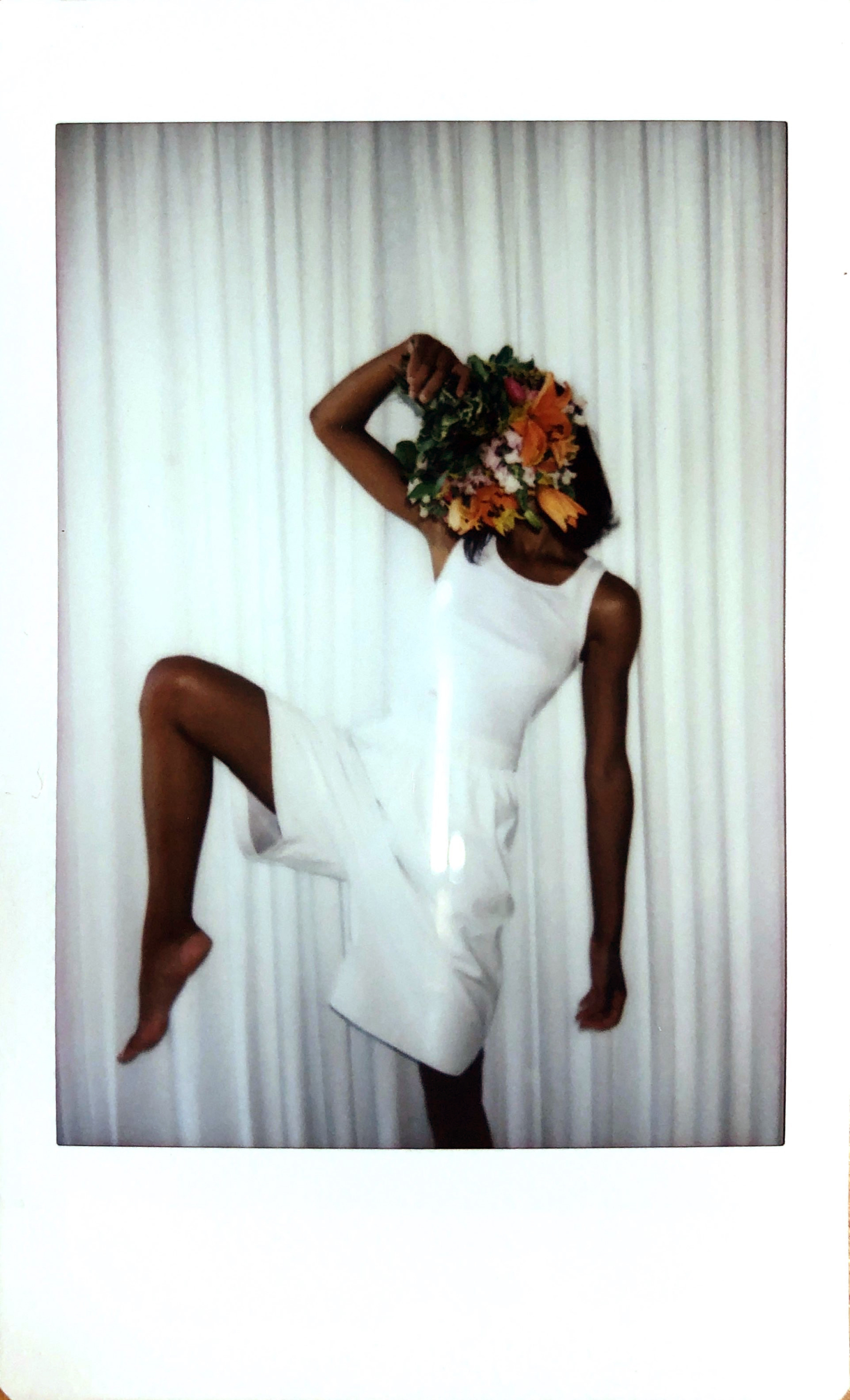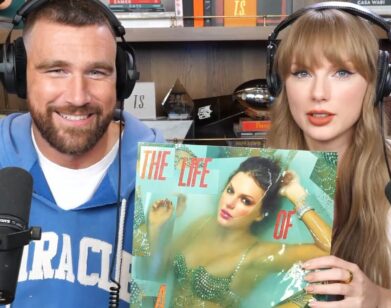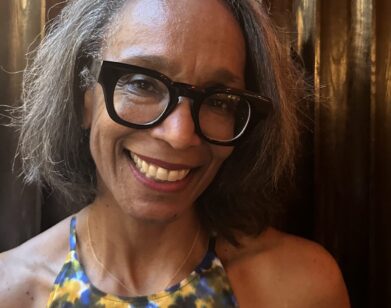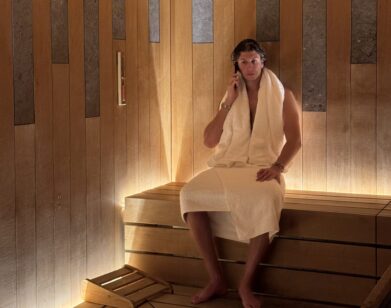Laura Harrier and Janet Mock on Representation in Hollywood and the Power of Beyoncé’s Touch
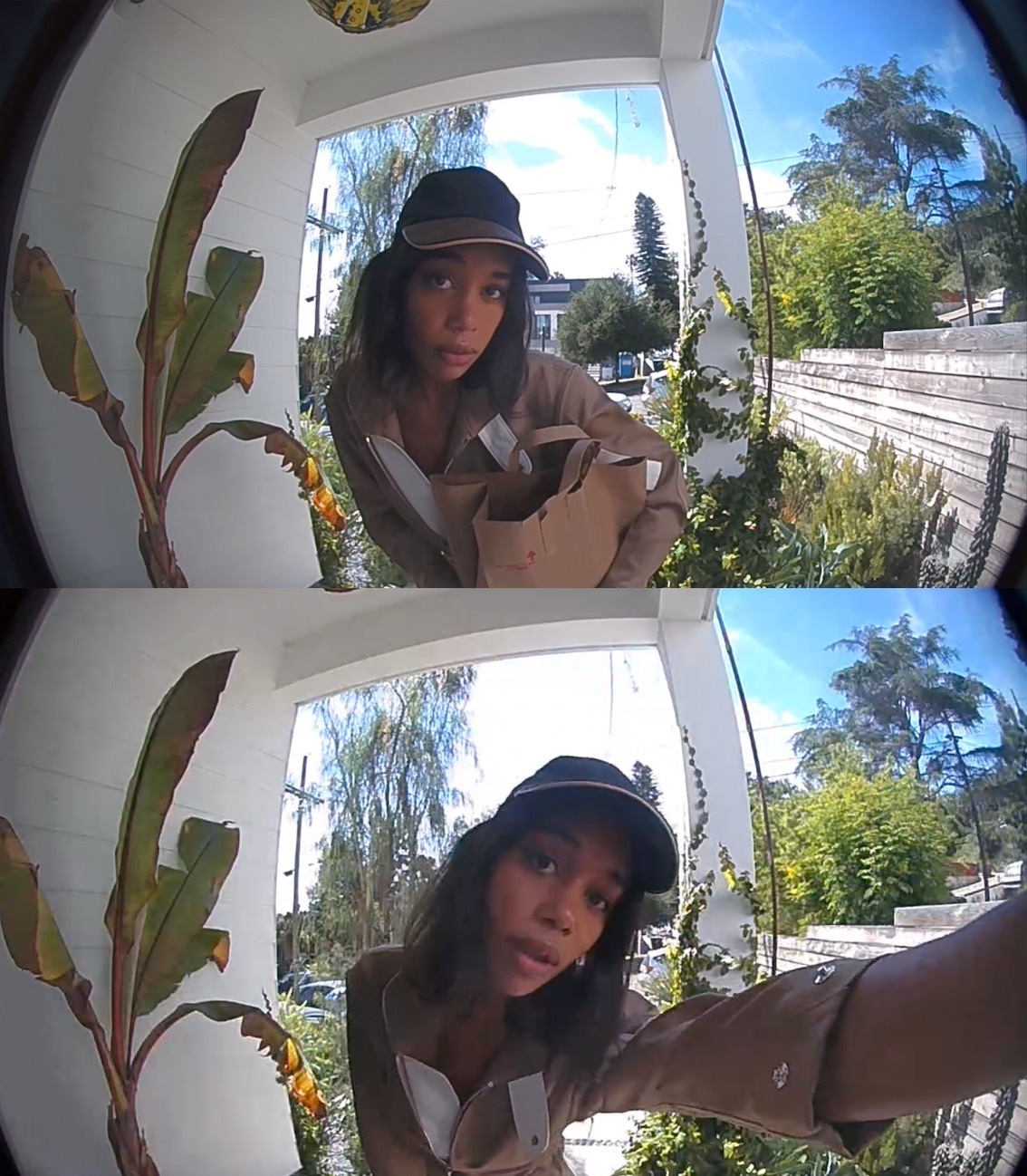
Jumpsuit and Hat by Louis Vuitton.
Laura Harrier began her acting career the way so many do: on a soap opera. As the single mom Destiny Evans on One Life to Live, Harrier got a crash course in the daily grind of showing up to set with your lines memorized. That work ethic served her well when she graduated to the big leagues, breaking barriers as Peter Parker’s first African-American onscreen love interest in the 2017 reboot Spider-Man: Homecoming, and then as a cop-hating student activist in Spike Lee’s 2018 Oscar-winning battle cry BlacKkKlansman. But for the 30-year-old Chicago native, a former model who has been the face of Louis Vuitton, it’s her role as the aspiring actress Camille Washington in Ryan Murphy’s Hollywood that made her examine her career’s true origin story. To prepare for the role of an African-American ingenue trying to make it in 1940s Los Angeles, Harrier dove into the legacies of Lena Horne and Dorothy Dandridge, two black actresses from that era who faced racial roadblocks throughout their lives, but who are now recognized as having paved the way for those who came after. That fact was not lost on the writer and director Janet Mock, who collaborated with Murphy on Hollywood, and who based the character of Camille on Dandridge. Harrier and Mock connected a few days before what would have been the Hollywood premiere, to discuss life in quarantine, the mindfuck of auditions, and the time they went to Beyoncé and Jay-Z’s party. — BEN BARNA
———
LAURA HARRIER: Janet, my love!
JANET MOCK: I miss you so much. I wish we could be doing this sitting on your plush pink couch in Silver Lake.
HARRIER: I know. It’s so boring. We were going to be so major on Monday for what should’ve been our premiere.
MOCK: Do you remember where you were and what you were doing when you were told to stay home?
HARRIER: I was out of town, so I had to come back. And then everyone got the order to stay home, so we made our way back here, and we’ve been hunkered down at my house in Silver Lake. What about you?
MOCK: I’m back in L.A., thank god. I went from wrapping our episode of Hollywood to flying to New York to direct the season three premiere of Pose when we got shut down. And they were like, “It’s going to be maybe two to three weeks, and then we’ll get right back up.” I was like, “That’s bullshit.” I knew immediately. I packed up all my shit, and jumped on a plane.
HARRIER: You just got out of there.
MOCK: How have you been coping with this new sense of what I call new unknowing? You don’t know when you’ll get to go back on a set. You don’t know when life is going to go back to normal. We don’t know what normal is. How have you been able to cope?
HARRIER: First and foremost, I’m just really grateful that I’m healthy and that all my loved ones are healthy. It’s a lot more than a lot of people can say. Day to day, it’s weird. Some days I’m like, “I got this. I’m great. I’m going to focus on me.” And then other days I’m like, “I can’t get out of bed. I hate this. I want to crawl into a hole.”.
MOCK: Those days when you’re in bed and you don’t want to come out, how do you cope on those days?
HARRIER: I’m trying to be easy on myself. I hope that everyone can take this time to not judge themselves for being scared and anxious. It’s hard because you look at Instagram, and you’re like, “Everyone is learning how to bake bread, and they’re making homemade pasta and they’re planting their garden. Why am I not being like that?”
MOCK: Absolutely not for me. That’s not my narrative. I love schedules, to know what’s going on and what I’m doing. And at first I had this burst of creativity. I’m like, “Oh my God, I don’t have to be on set, and I can actually sit down and write without a deadline.” And then after a while, I was like, “Why am I forcing myself to be so productive? I could also just sit still for a little and find little moments of joy, of being present, of reading a book, of watching reality TV.” One of the things that has kept me busy has been promoting our little show. How did you hear about the project? I want to know the origin story because I haven’t even heard it yet.
HARRIER: It was maybe a year ago. I got this audition that just said, “Untitled Old Hollywood Project.” I had no idea what it was for. But I went in and read a scene from a movie from the ’40s. I did a sort of Mid-Atlantic accent that I stitched together, and then didn’t hear anything for over four months, and I forgot about it.
MOCK: Is that typical?
HARRIER: It’s not really normal. Usually you hear if something’s going forward within a few weeks. Or I’ll ask my agent, “Did they give it to someone else?” And he’s like, “Yeah, it’s going to so-and-so,” or, “You have another audition.” So for it to be out in the ether with no information, that was weird. I figured I didn’t get the part or the project wasn’t going forward. And then four or five months later, I got a call from my agent saying, “Ryan Murphy wants to meet, and you’re going to do a chemistry read with Darren Criss.” I was super nervous, but funny enough, Darren was more nervous than I was.
MOCK: Really? You clocked it right away that he had the jitters?
HARRIER: He kept saying, “I’m so nervous.”
MOCK: Oh my God.
HARRIER: It was me and two other girls in this waiting room. And you know how Darren gets when he’s kind of rambling, being really funny and charming, but just anxiously talking.
MOCK: I had no idea it was such a mindfuck. I can’t imagine sitting in a holding room and there’s two other women going in and out.
HARRIER: Yes, it sucks. These other girls who look like a different version of you. You see the same people over and over because there are a couple of us who kind of look the same and keep going in for the same stuff. I went in last, and Ryan was just sort of there, silently in the corner. That was the first time I met him. I read the scene once and walked out, and I had no idea how it went. But the next morning I got a call offering me Camille.
MOCK: That feels like a Hollywood story in and of itself. You’re mostly known for your film work. What was intriguing to you about coming to television?
HARRIER: First and foremost, it’s working with Ryan Murphy. I would’ve signed up for anything he wanted me to do. I never really wanted to do TV unless it was in a forum like this, as a limited series that felt special, with a message, and with characters that I could connect with. I had no desire to be on CSI: Las Vegas or whatever.
- Shirt Laura’s Own. Shorts by Bottega Venta.
MOCK: When Ryan first told me that you were onboard for the project, I was so excited because to me, you were this enigma, and I was like, “I want to know more about her. I love her fashion. I love the look she’s turning on Instagram. I love the afro she had in BlacKkKlansman.” And I was so excited about Camille specifically because I knew it was going to be a pivotal role for the series, and largely why I was recruited to work on it. So I did my deep dive into your work, and I remember telling you at our first lunch, “Oh, Laura’s from the movie stars who started off in soap operas.”
HARRIER: That’s not what happened, Janet. You texted me a clip of myself on the soap opera. You’re like, “Is this you?” When I first met you, I was trying to seem like a cool, serious artist. And you’re like, “Girl, do you.”
MOCK: You were on One Life to Live. That is iconic. I don’t care what anybody says. I was stanning Destiny Evans, single working mother, hard. What was it like for you to make that leap through something I would assume is so challenging?.
HARRIER: I’ve never worked so hard, honestly. I’d have to memorize 30 pages a night, and you’re showing up to work at 5:00 AM. It was also my first acting job. It gave me a really good work ethic and helped me be prepared for showing up to sets with my lines memorized. It’s like boot camp.
MOCK: So many stars started off in soaps. You have Brad Pitt, Julianne Moore, Meg Ryan, Demi Moore. It’s like a pipeline.
HARRIER: There is definitely some positivity to be had out of it if you can escape at the right time.
MOCK: What was your first relationship to the time period that we were covering with Hollywood? Do you remember the big stars from that time that made an indelible mark on you?
HARRIER: My first impressions were people like Grace Kelly, Katharine Hepburn, Marilyn Monroe, and watching Casablanca with my mom when I was young. I always thought it was such a beautiful and glamorous time period, but I never felt connected to it personally, because when I’d watch those movies, nobody looked like me, and everyone that did were maids or slaves. It wasn’t until later when I found out about Dorothy Dandridge, and I only knew who she was because of the Halle Berry film. And it was like, how did this woman exist who was so beautiful, so talented, and so glamorous, and I don’t know who she is? Why do we talk about Marilyn Monroe all the time but we don’t talk about Dorothy Dandridge?
MOCK: At our first lunch, we talked about it, the feeling of wanting to do justice by Dorothy Dandridge and Lena Horne, too.
HARRIER: They never gave Lena Horne anything to do. She was alone on camera all the time because they had to be able to cut her scenes so they could play them for white audiences in the South. The studio system was awful for her, to the point where she left. And then for Dorothy, her story makes me so sad, because she just was such a bright light, and she’s one of those tragic Hollywood stories. She died at the height of her beauty and talent. It was taken away so abruptly. Through Camille, I want to hopefully reimagine a happier ending for her. What if she had been able to win the Oscar when she was nominated? And after that, what if the roles that she was offered were worthy of her talent? She would have had a very different career, and consequently, Hollywood would’ve looked really different.
MOCK: What parallels do you see between obviously yourself, Camille, and Dorothy?
HARRIER: There’s definitely a through line there. I just kept thinking about what it must’ve been like to be the only one in the room. We both know what that feels like. They had to realize that fighting for visibility was about a lot more than themselves. It was about all the little black girl who could see someone on screen being intelligent, and beautiful, glamorous, and desired, completely different from how society has portrayed women of color in the past.
MOCK: What’s it like building a character while not knowing where her arc is going to end?
HARRIER: It’s really difficult, honestly. When I signed on to Hollywood, I hadn’t even read anything. Ryan Murphy was very top secret. I didn’t know exactly what I was signing up for. Then as the scripts come in, it’s not like you sit down and read the whole thing. I didn’t know how Camille’s story was going to end up, so it’s really like a leap of faith. I had to figure out where she comes from, what her life experience was, what her motivations are, who her relationships are with, and build the basis from there.
MOCK: There’s a theme in Ryan’s shows. It’s the journey of watching outsiders become insiders, in a way. Do you feel like you’re still an outsider looking in, or an outsider who’s been invited in? What does that look like for you, that sense of belonging in this industry?
HARRIER: I still feel like an outsider, like I’m in these rooms, talking with people, and I’m like, “How the fuck did I get here?” I have a different background from Camille because she grew up in coal country during the Depression, and I grew up in middle-class suburbia. But at the same time, I’m not in any way from this industry, so it’s always a pinch-me moment. I don’t ever feel like this is normal. I was in Cannes for BlacKkKlansman, and Cate Blanchett was the president of the jury. We were chatting, and she was like, “How crazy is that red carpet, it’s so intimidating, right?” And I was like, “You still feel like that?” And she was like, “Oh yes, honey. That never goes away.” If Cate Blanchett says that, I think that everyone sort of feels like that all the time. So that made me feel better. What we do is not normal, and I don’t think it should feel normal.
MOCK: I would argue, if Cate Blanchett is speaking to you at Cannes, you’re an insider. You made it. But I have that feeling, too. I remember when I got my invite to the Met Gala. I was like, “Oh my God.” When I worked at People, I would sit there late at night watching, and having to report on it. So when you get to step in, and you’re like, “Oh my God, I’m here.” And then it’s this thing of like, “Wait, why am I here? Are they sure? Is this a mistake?”
HARRIER: I know!
MOCK: Well, let’s just talk about it. We were all together at Beyoncé and Jay-Z’s Gold Party, you, me, and Jeremy [Pope]. That was a moment. We just finished wrapping a series together, and now Beyoncé‘s over there dancing, and Rihanna’s right over here.
HARRIER: It’s so crazy. Do you remember when the three of us were dancing, and then Beyoncé came over and hugged me, and I started to cry?
MOCK: Our forebears have done this so that we could hug Beyoncé and dance next to her.
HARRIER: I think about my grandmother, who had to go pick cotton in the summers on her grandfather’s sharecropping farm. And now I’m hugging Beyoncé at the Gold Party.
———
Fashion Assistant Ashling Massoumi

